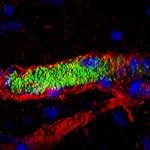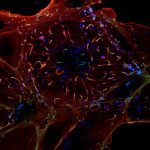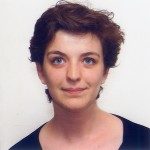Post-Doc Call: Mechanobiology of meningococcal infection
Are you a biophysicist interested in bacterial infections?
We are looking for a talented researcher willing to dig into the forces at play at the host/pathogen interface.
Few recent studies have shown that pathogens can target essential regulators of cell mechanics to impact cellular functions, opening a new exciting avenue of research. In particular, vascular colonization by Neisseria meningitidis has proven to largely depend on a series of mechanical processes, eventually causing septic shock and/or meningitis. These include bacterial adhesion to the blood vessel wall, proliferation to form aggregates and resistance to blood flow, leading to vascular damage. All these steps rely on type-IV pili, long dynamic fibers at the bacterial surface that can exert high pulling forces.
Interestingly, the study of pili dynamic properties has brought to the discovery of novel fundamental concepts in the physics of living systems: for instance, meningococcal aggregates behave as active viscous fluids, rapidly adapting to blood vessel geometry for efficient vascular colonization. In addition, pili induce a peculiar deformation of the host cell plasma membrane through a new physical process called 1D-wetting, rapidly followed by remodeling of the actin cytoskeleton.
Here, we will focus on how bacterial infection impacts host cell mechanics and physiology at the single cell and tissue scale, potentially leading to force unbalance within the endothelium and vascular damage. This project promises to uncover general principles of cell mechanics regulation and function. In this sense, bacteria can be considered as a tool to probe and perturb the host cell surface, to better understand how cortical tension and forces are regulated within a cell. Finally, this work will contribute to a better understanding of force balance mechanisms and mechano-transduction pathways involved in vascular homeostasis.
This project will be hosted in the Pathogenesis of Vascular infections Unit (Head: Guillaume Duménil) at Pasteur Institute, Paris and supervised by a young investigator with an expertise in the biophysics of infection, Daria Bonazzi. The candidate will be integrated in an interdisciplinary team that combines biochemistry, microbiology, cell biology, biophysics and animal models of infection.
Activities
The candidate will develop innovative and ambitious approaches to reveal the impact of bacterial infection on host cell/tissue mechanics, and their functional consequences for pathogenesis. This includes high-resolution live microscopy, biophysical methods such as traction force microscopy and micro-patterning, image analysis and modeling. Last-generation microscopy (FLIM-FRET, SIM, STORM) as well will be available on the Photonic Bioimaging Platform in Pasteur.
Knowledge & Skills
A good expertise in the fields of cell biology, biophysics and/or microbiology is required. Prior experience with force measurement methods and image analysis will be a strong plus. The candidate should have a PhD degree in biophysics or equivalent with a good publication record.
The ability to interact with scientists across multiple labs specialized in quantitative imaging, biophysics and infectious diseases will be key to succeed in this project.
Application
Please send a CV, a cover letter, a research statement summarizing previous work experience and research interests, and contact information of two references to Daria Bonazzi (daria.bonazzi@pasteur.fr).
Funding body: ANR Jeunes Chercheurs.
Duration: 36 months.


